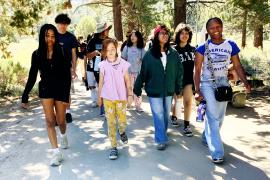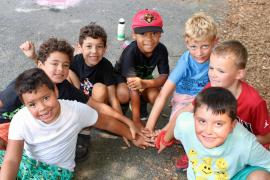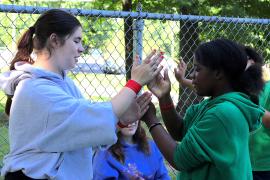We had a missing camper. I was seconds away from sending my staff to search the dark lake on a moonless night when I received the news that we’d found him. I made my way headlong toward the child. Thankfully, I was stopped by the head counselor before I could mess up one of the best pieces of camp counseling I had ever witnessed, coming from Carlos, a 16-year-old, first-year counselor-in-training.
“I’m sorry that I wasn’t able to make this week better for you,” said Carlos.
“It’s not your fault,” Jacob, the missing camper, mumbled.
“But it’s my job.”
After a long, sad, cricket-filled pause, Jacob, who had indeed experienced a rough week at camp, started talking to Carlos through the shadows. They talked for almost an hour. I believe they’re still in contact to this day.
For years, I’ve wondered how Carlos knew to turn what I saw as a discipline issue into a moment of connection with a troubled camper. And how did that head counselor know to stop me in my tracks, allowing for this moment to unfold? Was the wisdom they exhibited that night something that could have only come naturally, from their gut, or is it possible to create an environment at camp that supports the intentional development of wisdom? Interesting work in practical wisdom may provide a blueprint for how camps can do just that.
Practical Wisdom
In contrast to general wisdom on personal or spiritual matters, practical wisdom considers how individuals respond thoughtfully and effectively in times of uncertainty (Baltes & Smith, 2008; Schwartz & Sharpe, 2006). A practical approach to wisdom suggests that camp staff may be able to develop skills supporting wise action.
Wisdom, distinct from intellectual knowledge, requires a balancing of skills, experiences, perspectives, goals, and situational qualities (Ardelt, 2008; Small & Kupisk, 2016). Having knowledge, therefore, is not enough to make wise choices. Rather, training, experience, and individual character strengths may all contribute to the application of practical wisdom in real-life situations.
Components of Practical Wisdom
Practical wisdom involves seeking ethical, positive solutions for the common good in response to uncertain situations (Schwartz, 2011; Sternberg, 1998). Small and Kupisk (2015) highlight six components that are likely to contribute to practical wisdom:
- reflection
- knowledge
- perspective taking
- problem framing
- purpose setting
- balance
Thus, practical wisdom is a skill distinct from intellect, which exists in varying degrees from person to person, and reflects individual qualities and life experiences (Kupisk, 2016). Intentional attention to practical wisdom as a framework for staff development can create a feedback loop whereby staff members, in reflecting on both their successes and missteps, can more accurately inform the ways they develop their skills over time (Roholt & Rana, 2011), thus youth workers often enter the field with diverse backgrounds and varying levels of experience working with youth. Drawing on mounting evidence that quality youth service requires skilled staff, professional-development opportunities have received increasing support by agencies and funders. Typically, youth work professional development supports propositional theory.
Reflection
Reflection is a process by which staff members give themselves time and space to examine their beliefs and abilities in the context of their roles as camp staff (Small & Kupisk, 2015). This is not distancing to avoid an emotional response to a dilemma, but rather a time to look at one’s personal philosophy, both in advance of, and after a problem. When I was a young staff member, the logical next step after breaking up a disagreement was to immediately resolve the conflict. I knew better than to go into a situation angry, or if the kids were too upset; the idea of “cooling off” made perfect sense. But beyond cooling off, I rarely reflected on my own beliefs in preparation for camp. Doing so could have equipped me with useful tools for better approaching situations throughout the summer.
Supporting Reflection
Our ideas may be a perfect fit for your camp, or they may be a starting point to spark ideas. For example, at my staff trainings we begin with a personal mission statement activity that helps staff organize their beliefs and goals in terms of camp work. Throughout the summer, camps could offer opportunities to reflect upon these mission statements. At religiously based camps, time for prayer and meditation may already be worked into a counselor’s daily routine, whereas other camps may need to consider how to integrate time for personal reflection. Having a dedicated, quiet, device-free space where reflection may be modeled by camp leaders can be a visual cue to the importance of reflection in times of calm or chaos.
Knowledge
Knowledge refers to possessing, seeking out, and utilizing multiple forms of knowledge to help with the solution to a problem. Knowledge comes in many forms, including formal knowledge, such as schooling and training, local knowledge, which refers to information about the immediate situation, personal knowledge, an awareness of one’s limitations and abilities, and gut feeling, a general sense about a situation usually derived from experience over time (Kupisk, 2016).
Supporting Knowledge
While we cannot magically procure years of experience for our staff, we can create an environment that supports gathering knowledge. Sending pertinent articles and videos to staff in the off-season can support continuing formal knowledge. I have spent years developing realistic scenarios for role-playing during staff training, including hiring a professional actor to react as a child might, so my staff can gather experience themselves and learn from others. Pairing seasoned counselors with new staff in a mentorship program can help young staff understand the role of personal knowledge and gut feelings when facing dilemmas at camp.
Perspective Taking
Perspective taking — or consideration of different points of view, motives, concerns, or goals of various people involved in a dilemma — is a key skill of a cabin counselor or other camp staff member (Kupisk, 2016).
Supporting Perspective Taking
One way to encourage perspective taking is having counselors spend a day as a camper, following all the rules, schedules, and transitions of a cabin. Remembering what it is like to have very little control over what happens, or whom it happens with, can be an excellent tool for counselors. Staff training programs that focus on team-building are valuable to help staff understand the perspective of their coworkers. One camp I know spends the first night of staff training around a campfire, sharing stories of the personal importance of camp. These stories include tales of being bullied at school, being physically weak, or growing up in foster care, and finding a safe home at camp. This intimate sharing allows new staff to understand the life events that have shaped their coworkers, increasing their ability to see the world through their colleagues’ perspective.
Problem Framing and Purpose Setting
While perspective taking deals with the different perspectives of the people involved, problem framing is about the different perspectives we can take when analyzing a problem. For example, if a counselor is frustrated with a camper asking question after question all day long, that counselor has an opportunity to frame this problem a number of ways. Is this a character flaw of the camper? Or perhaps the child is neglected at home and craves adult attention at camp? Is the child on the autism spectrum and using aural input to process his world? By framing the problem in several different ways, the staff member is more likely to come up with a workable, long-term solution to the problem (Kupisk, 2016).
Purpose setting is about clearly defining the goals of dealing with a dilemma (Kupisk, 2016). Helping staff members define the bounds of their jobs during staff training is an important part of purpose setting. However, purpose setting is also about deciding what’s important and achievable, based on our skills and our roles, when faced with a dilemma. For example, one summer we had a terminally ill camper who had been placed in foster care. While she had a wonderful week at camp, closing day was very difficult for her. Complicating matters further, the foster family had the wrong date for the end of camp and did not arrive to take the child home, requiring us to wait for a medical transport vehicle. I watched her counselors faced with a dilemma: what to do with this child while the camp turned over and got ready for a new batch of kids? What was their purpose in this situation? While there were many issues involved, including issues with foster care, with her health, and with the quick turnover of camp, it was beautiful to witness the counselors decide to keep this child happy and protected. They took her to a space away from the bustle of turnover and sang her favorite song at the top of their lungs for an hour until her ride arrived.
Supporting Problem Framing and Purpose Setting
Problem framing and purpose setting are closely linked. Indeed, staff who are able to see a problem from multiple angles have a greater number of end goals they can try to meet. It’s at this point where skill, expertise, and philosophy can intersect en route to the most effective solutions. Research shows that wise practitioners tend to frame problems as learning opportunities (Larson & Walker, 2010; Kupisk, 2016). For example, the counselor with an overly inquisitive camper may more easily manage his or her frustration if he or she sees the problem as an opportunity to create a positive relationship with a child who has experienced neglect at home. In comparison to novice practitioners, those with more experience demonstrate an ability to identify a greater number of potential solutions to practice dilemmas (Larson, Gibbons & Walker, 2009; Larson & Walker, 2010). Sharing creative responses to dilemmas during staff meetings is an excellent way for staff to broaden their repertoire of effective problem-solving techniques. Between staff meetings, consider using a bulletin board to post examples of excellent problem framing from which everyone can learn.
Balance
Balancing the components of practical wisdom discussed so far is really a skill in integrative thinking. This type of thinking requires staff members to consider the complexities of a situation to form relevant and thorough solutions (Kupisk, 2016). When Carlos, the staff member from the opening scenario, states definitively that he believes it is his job to make the week as good as possible for Jacob, it’s clear that Carlos has spent some time reflecting on his role as a counselor, or perhaps even his mission for the summer. He utilizes his local knowledge of the situation to determine that Jacob is safe, while his inclination toward empathy is perhaps related to the formal knowledge he received during our Love-and-Logic-heavy staff training. This use of empathy may also stem from Carlos’s ability to look at the situation from Jacob’s perspective. Jacob already knows he’s not supposed to wander off and is likely bracing for discipline. Carlos approaches with love instead — to a great result.
Carlos also asks himself, “Why would a camper wander away from the safety of a well-lit path into the pitch black to be alone?” In that moment, he is framing the problem in terms of Jacob’s personal unhappiness at camp rather than looking at the situation as a discipline issue or a prank. Through this frame, Carlos is able to set his purpose: He uses this problem as an opportunity to build a relationship with Jacob, rather than yelling at him for leaving the group or writing him off as just another discipline problem.
“I’m sorry that I wasn’t able to make this week better for you.”
“It’s not your fault.”
“But it’s my job.”
This simple exchange integrates every aspect of practical wisdom. This is why I call it the best piece of camp counseling I have ever seen.
Supporting Integrative Thinking
Of course, it’s unlikely Carlos was consciously calculating these functions of practical wisdom when he interacted with Jacob; however, his ability to integrate them all made this a truly wise moment. By finding intentional ways to practice the components of practical wisdom, staff can more intuitively make decisions that incorporate their own philosophies, technical skills, and personalized knowledge of campers. Talking through complex dilemmas with staff using the lens of practical wisdom, both during and after a situation resolves, is an excellent way to support a culture of integrative thinking at camp. You might ask staff to reason through how they might advise a coworker to deal with a dilemma. Research suggests that individuals are better able to approach situations wisely from a third-person vantage point (Grossman & Kross, 2014).
A Model of Practical Wisdom
There are many ways to try to get the very best out of your staff. By adopting the model of practical wisdom, though, you can promote and build the skills necessary for camp staff to more effectively navigate the complex environment that is camp, and ultimately lead toward wiser interactions with youth.
References
Ardelt, M. (2008). Self-development through selflessness: The paradoxical process of growing wiser. In H. A. Wayment & J. J. Bauer (Eds.), Transcending self-interest: Psychological explorations of the quiet ego (pp. 221–233). Washington, DC: American Psychological Association.
Baltes, P.B., & Smith, J. (2008). The fascination of wisdom: Its nature, ontogeny, and function. Perspectives on Psychological Science, 3, 56–64. Retrieved from http://doi.org/10.1111/j.1745-6916.2008.00062.x
Grossmann, I., & Kross, E. (2014). Exploring solomon’s paradox: Self-distancing eliminates the self-other asymmetry in wise reasoning about close relationships in younger and older adults. Psychological Science, 1–10. Retrieved from http://doi.org/10.1177/0956797614535400
Kupisk, D. (2016). The role of practical wisdom in youth practice. (Unpublished Master’s Thesis). University of Wisconsin, Madison, Wisconsin.
Larson, R.W., Rickman, A.N., Gibbons, C.M., & Walker, K.C. (2009). Practitioner expertise: Creating quality within the daily tumble of events in youth settings. New Directions for Youth Development, 2009(121), 71–88. Retrieved from http://doi.org/10.1002/yd.297
Larson, R.W., & Walker, K.C. (2010). Dilemmas of practice: Challenges to program quality encountered by youth program leaders. American Journal of Community Psychology, 45 (3–4), 338–349. Retrieved from http://doi.org/10.1007/s10464-010-9307-z
Roholt, R.V., & Rana, S. (2011). Improving community-based youth work: Evaluation of an action research approach. Child & Youth Services, 32(4), 317–335. Retrieved from http://doi.org/10.1080/0145935X.2011.639240
Schwartz, B. (2011). Practical wisdom and organizations. Research in Organizational Behavior, 31, 3–23.
Schwartz, B., & Sharpe, K.E. (2006). Practical wisdom: Aristotle meets positive psychology. Journal of Happiness Studies, 7, 377–95. Retrieved from https://link.springer.com/article/10.1007/s10902-005-3651-y
Small, S.A., & Kupisk, D. (2015). Wisdom in practice. In M. Walcheski and J. Rienke (Eds.), Family Life Education: The Practice of Family Science (3rd ed.). Minneapolis: National Council on Family Relations.
Sternberg, R.J. (1998). A balance theory of wisdom. Review of General Psychology, 2, 347–365. Retrieved from http://psycnet.apa.org/psycinfo/1998-11409-001
Anne Henningfeld, MA, CTRS, is the managing partner of Beyond Recreation, a consulting firm dedicated to creating meaningful connections through recreation. She has directed several camps, including Camp Bold Eagle, the oldest camp for children with bleeding disorders in the country. She currently presents staff trainings and other programming at camps across the country.
Dayana Kupisk, MS, is an instructor and doctoral candidate in the department of Human Development and Family Studies at the University of Wisconsin-Madison, where she studies wisdom in practitioners of evidence-based programming. She has experience developing and presenting programming for at-risk and medically specialized youth populations.
Photo courtesy of Wohelo Camps, Raymond, Maine.



